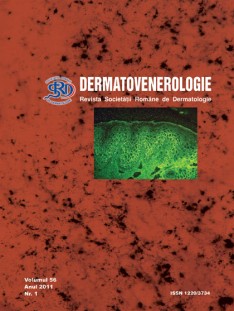Referate generale
Implicatiile desmozomilor in bolile cutanate
Desmozomii sunt jonctiuni de adeziune intercelulara a celulelor epiteliale. Sunt de asemenea implicati in semnalizarea si diferentierea celulara. Din punct de vedere biochimic au fost identificate si caracterizate urmatoarele proteine desmozomale principale: desmogleine, desmocoline, plakoglobina, desmoplakine si plakofiline. Caderinele desmozomale formeaza adeziuni calciu-dependente intre keratinocitele invecinate. Domeniul citoplasmatic al desmogleinelor si desmocolinelor interactioneaza cu plakoglobina, care se leaga de desmoplakina. In final, desmoplakina se ancoreaza de filamentele intermediare ale citoskeletului. Desmozomii sunt implicati in mecanismele fiziopatologice ale bolilor autoimune, genetice sau infectioase cutanate.


